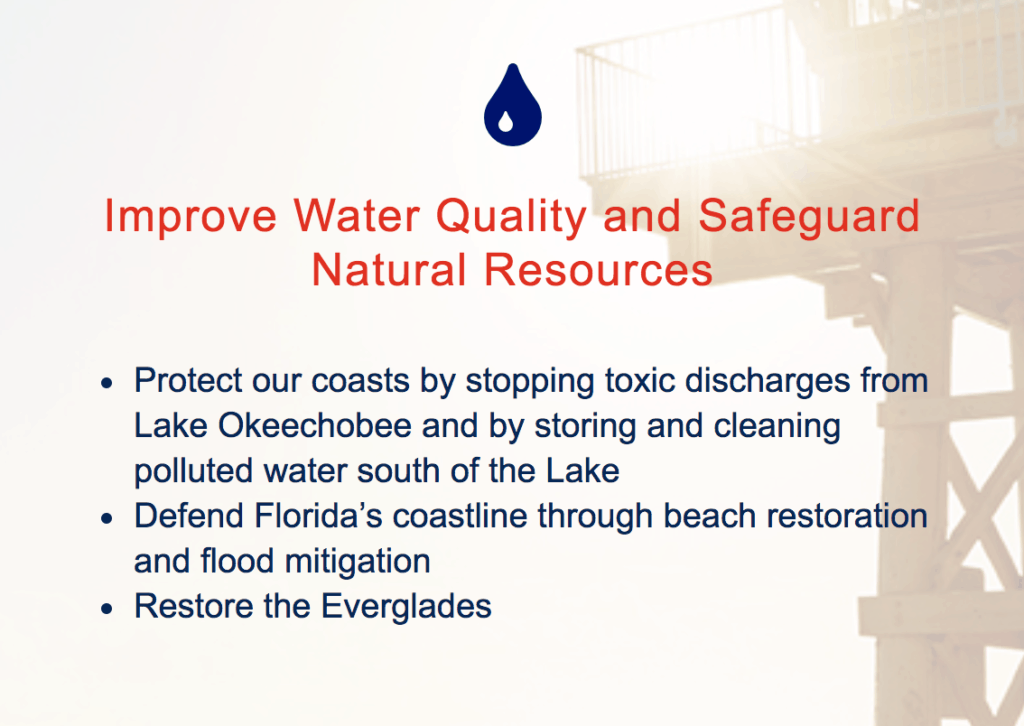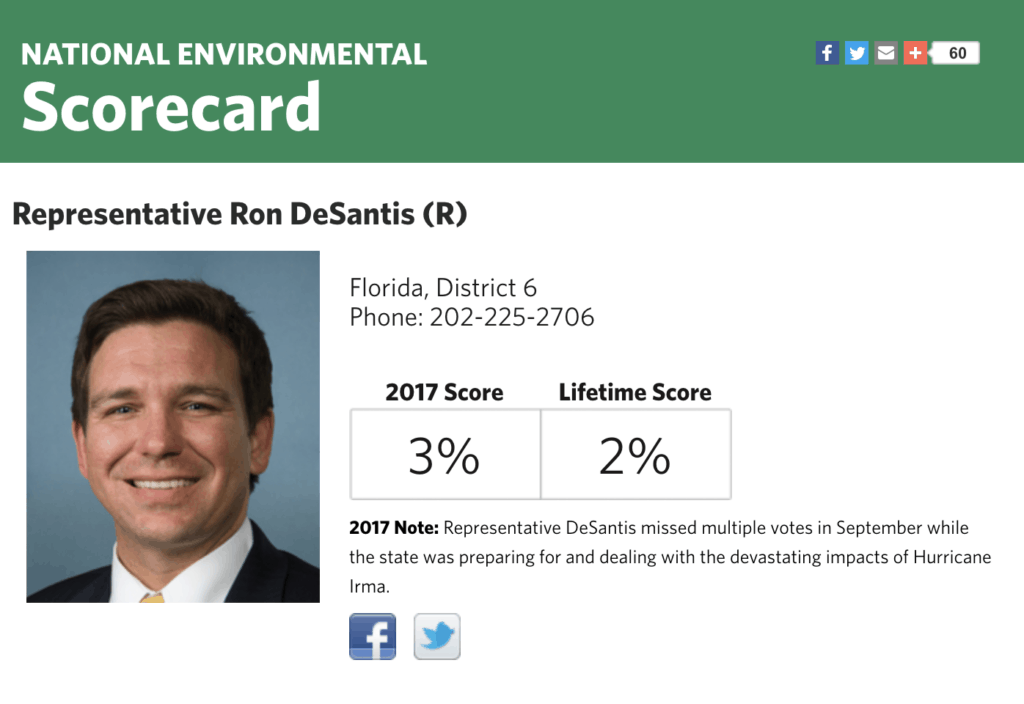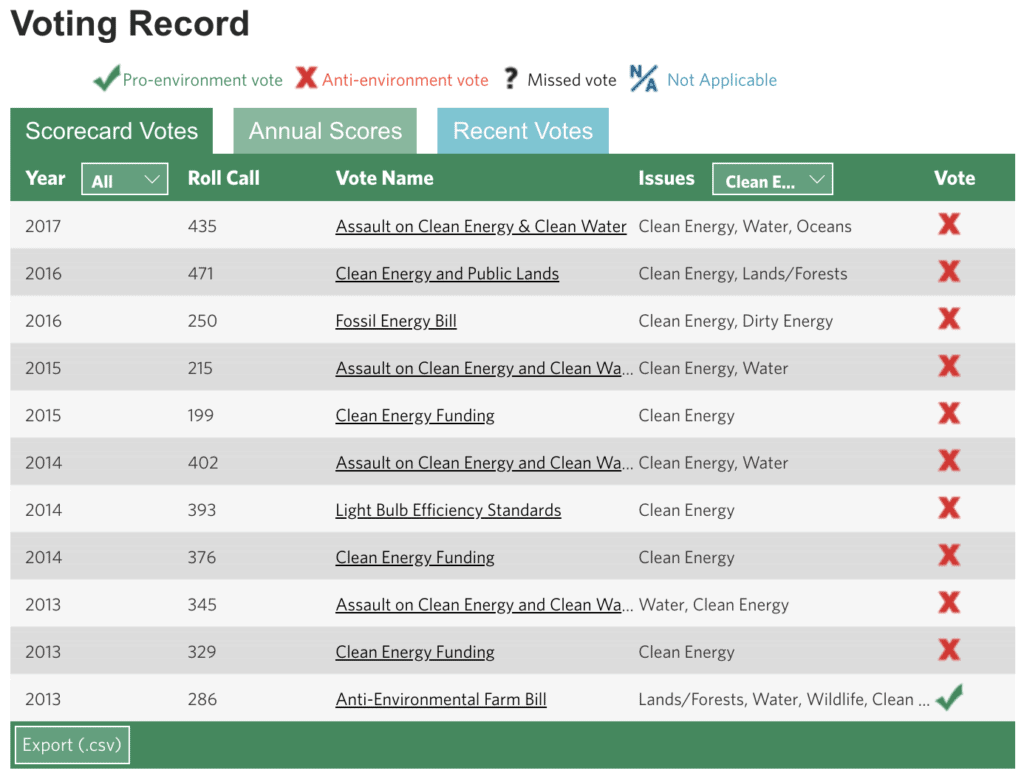On Aug 28th, 2018 Andrew Gillum (D) and Ron DeSantis (R) both shocked the political establishment by winning their respective primaries in the race to be the next Florida Governor. Florida, a notorious swing state, will host a fierce battle between an unabashed progressive in Gillum and a Trump protege in DeSantis.
The race will have a profound impact on the future of clean energy in Florida.
Gillum Signs the No Fossil Fuel Money Pledge
Gillum, a vocal supporter of clean energy, says on his website, “Andrew believes that the best way to address the impacts of climate change is to embrace a plan to transition Florida to clean energy as rapidly as possible. Achieving this goal will put us on a path to a completely clean energy economy, creating thousands of new jobs in Florida, and cleaner air and healthier families.”

Figure 1. The No Fossil Fuel Money Pledge
On August 17, 2017, Gillum signed the No Fossil Fuel Money Pledge which states, “I pledge to not take contributions from the oil, gas, and coal industry and instead prioritize the health of our families, climate, and democracy over fossil fuel industry profits.”
The pledge covers utilities that generate 50% or more of their electricity from fossil fuels, which includes two cornerstones of the Florida political establishment, NextEra Energy and Duke Energy. NextEra is the parent company of Florida Power & Light. Southern Company, current owner of Gulf Power, is also on the prohibited list, however it is divesting from Florida due to financial pressures from failed projects in Mississippi and Georgia.

Figure 2. Screenshot of Major Utilities Subject to No Fossil Fuel Money Pledge
Gillum is not alone in rejecting money from NextEra and Duke.
Ex-Republican State Senator and gubernatorial candidate Jack Latvala stopped accepting campaign contributions from the utility companies in September of 2017. “It’s time the utilities stop spending money on political candidates and instead protect the residents of this state,” said Latvala in a release. Sensing the unpopularity of monopoly utility companies, Latvala told Steve Bousquet at the Tampa Bay Times, “They [Duke Energy] need to be spending that money on improving their grid and not giving it to politicians.”
As Mayor of Tallahassee, Gillum supported a ban on fracking. Gillum does have one vote, however, that gives clean energy advocates pause. In 2005, while a Tallahassee city commissioner, he voted in favor of a $1.5 billion coal-fired power plant in north Florida, according to a report by the Tampa Bay Times. The plant was never finished even though the City of Tallahassee spent more than $2 million on the failed project.
DeSantis, Anti-Wind and Pro-Pipeline
DeSantis’ website offers few details on his energy-related positions. DeSantis briefly touches on water quality issues that have plagued Florida for years.

Figure 3. Ron DeSantis’ Environmental Positions per Campaign Website
His time in Congress, however, tells a story of a politician who stands with fossil fuel interests.
In an August 2014 letter to the House of Representatives’ leadership, DeSantis advocated for the expiration of the wind energy production tax credit (PTC) claiming the PTC was “a key priority for the Obama Administration and its efforts to prop up wind and other favored “green energy” technologies” and “caused significant price distortions in wholesale electricity markets.” Florida headquartered NextEra Energy Resources, the unregulated arm of NextEra, claims it “is the world’s leading operator of wind energy,” and has benefitted handsomely from the PTC.
In May 2013, DeSantis voted against an amendment that would have required the Department of Homeland Security to conduct “a study of the vulnerabilities of the Keystone XL pipeline to a terrorist attack and certify that necessary protections have been put in place.” Earlier in 2013 he wrote a letter to then President Obama urging approval of Keystone XL. Keystone XL has already experienced massive oil leaks.
The League of Conservation Voters (LCV) scored DeSantis as voting for pro-environmental legislation just 2% of the time during his career in Congress.

Figure 4. Ron DeSantis’ Scorecard from the League of Conservation Voters
DeSantis voted against 10 out of 11 pro-clean energy bills during his time Congress, according to the same scorecard.

Figure 5. Ron DeSantis’ Voting Record per League of Conservation Voters
Influencing the Florida Public Service Commission
Florida’s Public Service Commission (PSC) is appointed by the governor rather than elected, unlike many other Southern states. The Florida PSC exists “to facilitate the efficient provision of safe and reliable utility services at fair prices.” Commissioners serve four year terms, meaning the winner of the governor’s race can fundamentally remake or retain the political makeup of the Commission within his first term in office.
Current Governor Rick Scott’s PSC has generally been pliant to utilities’ demands, including cutting energy efficiency goals and slashing incentives for renewable energy. After decimating customer programs, the PSC then allowed Florida Power & Light to charge customers almost $750 million for risky fracking exploration in the Midwest. That decision was ultimately overturned by the Florida Supreme Court, which stated that the PSC exceeded its statutory authority.
Rick Scott’s Legacy for Florida
The next Florida governor will take the mantle from a governor who proudly doubts climate change and is allied with the large monopoly utilities in the state, even though Florida will the state hardest hit by the impacts of climate change. Scott owned stock in Spectra Energy, a part-owner of the controversial Sabal Pipeline, through a blind trust. NextEra and Duke Energy planned to buy gas from the pipeline and in 2013 Scott signed legislation to speed up permitting of the pipeline at the beckoning of Sam Forrest, a Florida Power & Light vice president and transition team official. June 2018 federal disclosures show Scott and his wife own $350,000 in NextEra Energy Partners stock.
Scott famously banned the Florida Department of Environmental Protection’s (DEP) use of the terms “climate change” and “global warming”. Scott received $1.1 million from monopoly utilities in his 2014 gubernatorial bid for re-election and in his current bid for U.S. Senate he has cozied up to powerful fossil fuel interests in search of campaign money.
Scott has funded his political campaigns from his personal wealth, but oil and gas money has also flowed into his campaigns. Scott had already raised “at least $880,000 in contributions from oil, gas and energy executives and employees to his campaign and from the industry to a pro-Scott super PAC”, according to a July 2018 report from the Tampa Bay Times.
Utilities Bet on Adam Putnam but Lose
Scott may have set a friendly agenda for oil and gas companies, but November 2018 could shape up to be a rough month for utilities regardless of who becomes the next governor. Neither Democrat Andrew Gillum nor Republican Ron DeSantis have received campaign contributions from Florida Power & Light or Duke Energy, according to an analysis of campaign records through August 31, 2018.
Florida Power & Light contributed more than $550,000 to Adam Putnam’s political action committee, Florida Grown, in his losing bid for the Republican gubernatorial nomination. Duke Energy chipped in another $50,000. Putnam also received hundreds of thousands of dollars from PACs aligned with the Associated Industries of Florida, which in turn received millions in additional contributions from utilities.
| Candidate/Committee | Date | Amount | Contributor Name |
| Florida Grown PC (PAC) | 1/3/17 | $250,000.00 | FLORIDA POWER & LIGHT |
| Florida Grown PC (PAC) | 11/5/17 | $5,100.00 | FLORIDA POWER & LIGHT |
| Florida Grown PC (PAC) | 1/4/18 | $300,000.00 | FLORIDA POWER & LIGHT |
| Florida Grown (PAC) | 1/17/18 | $50,000.00 | DUKE ENERGY |
Table 1. Utility Contributions to Adam Putnam’s PAC in the 2018 Election Cycle
Which horse, if any, utilities Florida Power & Light and Duke Energy choose in the gubernatorial general election race, has yet to be determined.
Header photo source: Wikipedia/Tim Ross


[…] the needle between priorities of the Left and Right. For example, though DeSantis supported the Keystone XL Pipeline and other pro-fossil-fuel policies while in Congress, he opposes drilling off Florida’s shores. […]
[…] the needle between priorities of the Left and Right. For example, though DeSantis supported the Keystone XL Pipeline and other pro-fossil-fuel policies while in Congress, he opposes drilling off Florida’s shores. […]
[…] the needle between priorities of the Left and Proper. For instance, although DeSantis supported the Keystone XL Pipeline and different pro-fossil-fuel insurance policies whereas in Congress, he opposes drilling off […]